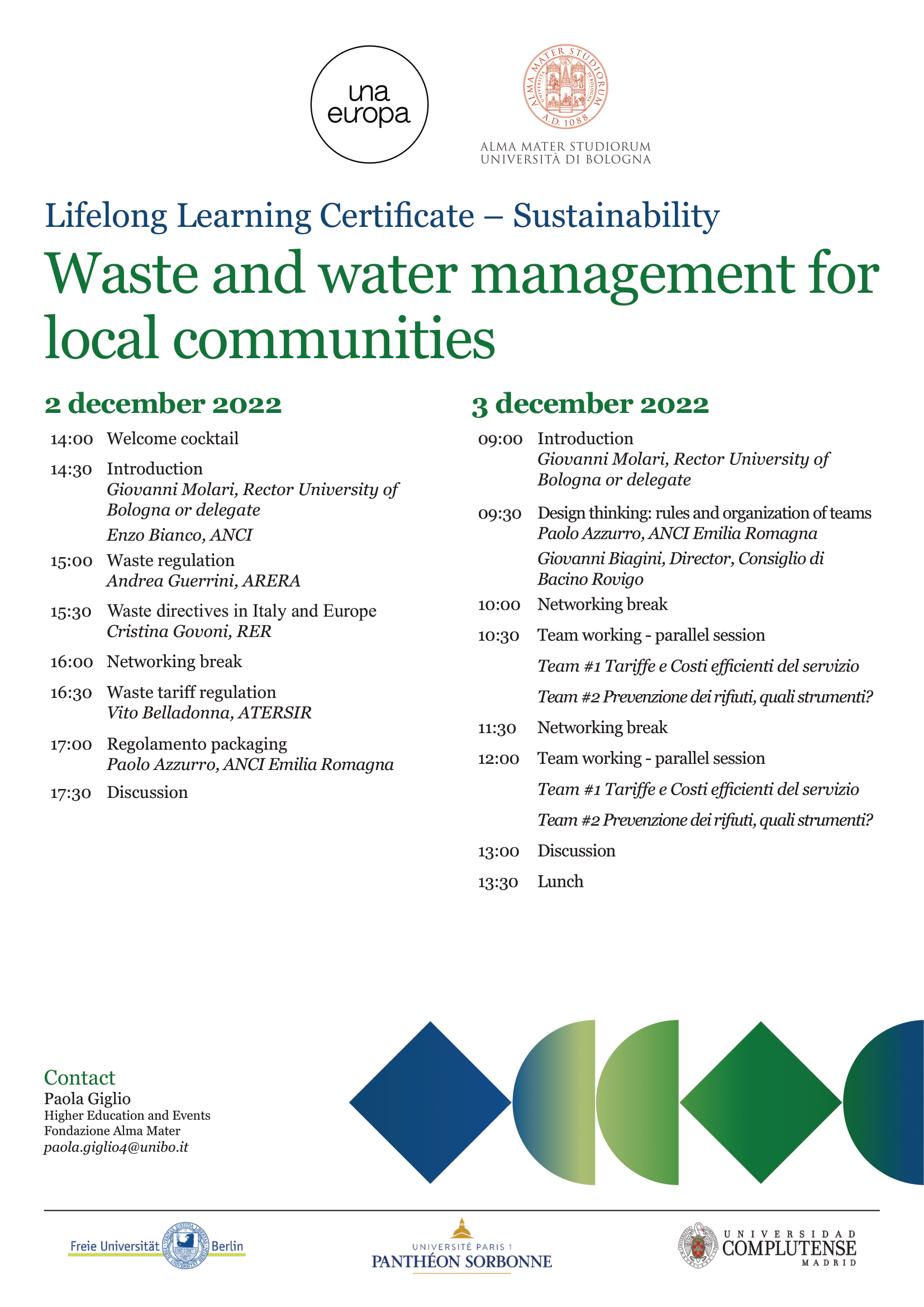Lifelong Learning Certificate in Sustainability: Waste and water management for local communities
Co-developed by
Course unit details
- ONLINE MODULE
- 1 - European Directives for Waste and Water
- 2- Tariff Regulation. Full Recovery Cost Model
- 3- Sustainability of Local Public Services. Life Cycle Thinking
- 4- Public services perspective in the framework of UNSDGs
- 5- Circular economy
- 6- Monitoring and assessment of environmental impact
- 7- Risk assessment
- 8- Waste management infrastructures and services
- IN-PERSON MODULE (BOLOGNA)
ONLINE MODULE
EIGHT TOPICS TO DELVE INTO SUSTAINABILITY IN THE UTILITIES SECTOR
1 - European Directives for Waste and Water
Held by Daniele Senzani (UNIBO)
Full title: Regulation (legislation). Administration by risk. European directives for Waste and Water
This seminar will focus the assignment of the water supply and the waste management service; tender vs. in-house providing; tender option: the regulatory frame and awarding criteria, and the nexus between awarding measure and contract obligations; long-term service contracts: service provision and sustainability criteria, financial balance, economic balance, and the risk-oriented approach.
2- Tariff Regulation. Full Recovery Cost Model
Held by Josefina Maestu Unturbe (REDS, MITECO) and Maria Salvetti (Paris1)
Full title: Tariff regulation (economics). Full recovery cost model (waste, water)
This seminar will give a theoretical background of cost recovery and its application in waste/water pricing. Moreover, it will give an overview on cost recovery and the ‘polluter pays’ principles, cost recovery and subsidies of waste/water pricing, the current institutional and regulatory frameworks of waste/water pricing in the EU. Finally, it will present examples of pricing framework in selected EU member states focusing on pitfalls and fallacies.
3- Sustainability of Local Public Services. Life Cycle Thinking
Held by Alessandra Bonoli (UNIBO)
This seminar will focus on definitions and tools of the Life Cycle Assessment (LCA) and the sustainability of local public services. It will also teach participants the applications of life cycle thinking in the implementation of sustainable use of natural resources and the pathway towards waste/water targets.
4- Public services perspective in the framework of UNSDGs
Held by Josefina Maestu Unturbe (REDS, MITECO) and Federica Farneti (UNIBO)
Full title: Public services perspective in the framework of UN’s Sustainable Development Goals (SDGs)
This seminar will delve into the UN’s Sustainable Development Goals (SDGs), how they interact with local public services, and what the international and national initiatives and targets are in relation to SDGs. Finally, it will present best practices related to these topics.
5- Circular economy
Held by Karel van Acker (KUL), Henning Wilts (WI, FUB), Vicente Galván López (UCM)
This seminar will present in four chapters the state-of-the-art in research and practice on circular economy. The introductory chapter defines circular economy in the European context and in that of climate change. The second chapter will provide information on the legal framework for circular economies in Europe and national examples on existing as well as missing regulation are discussed. The third chapter is divided into three local examples from Spain, Germany and Belgium on circular economy success stories. The last chapters discusses barriers (technical, legislation and regulation) to the transitions towards circularity and looks at cities and circular economy as well as the role of digitalization and circular economy.
6- Monitoring and assessment of environmental impact
Held by Pedro Martínez Sánchez (UCM) and Fabrizio Passarini (UNIBO)
This seminar will provide a quantitative assessment of environmental impact of local public services by looking at EU directives and regulation framework. Local and national examples will be given to explore regulation, legislation and success stories. A key aim of this lecture is to reflect on the concept of environmental impact in its broadest sense, so as to understand the diversity of effects that public infrastructures have on the environment. In this context, the lecture will refer to EU directives and regulations as the necessary, if sometimes insufficiently harmonized, framework for environmental assessment. A discussion about the importance of considering different scenarios in which the environmental contamination takes place, going beyond the concept of law limit, will be developed. In particular, the lecture will offer some considerations about emerging pollutants, the choice of different indicators, the presence of multiple receptors.
7- Risk assessment
Held by Edwige Dubos-Paillard (Paris1) and Luca Trapin (Unibo)
This seminar will present the state-of-the-art in environmental risk assessment, discussing terminology and definitions, its use and applications. It will also be assessed the scale of the problem, in addition to health and safety regulation at EU and national level by taking into account risk assessment principles such as hazard, risk, and competency, and practical risk assessment process analysing case studies and success stories.
8- Waste management infrastructures and services
Held by Giovanna Suave (KUL), Klaus Fricke (TU Braunschweig, FUB) and Andrea Pfiffer (TU Braunschweig, FUB)
This seminar will present the state-of-the-art in research and practice in waste management. It will be divided into six chapters, with a particular focus on the role of waste management in the transition to a circular economy, and the climate impacts of the different waste management strategies. Chapter 1 will introduce the concept of waste, the role of solid waste management in a circular economy, and the climate implications of current waste management practices. Chapter 2 will present waste disposal in landfills focusing on the climate impacts and potential landfill management solutions used to mitigate negative effects. Chapter 3 will discuss the thermal treatment of waste in terms of potential and limitations. Different waste-to-energy (WtE) technologies are presented and compared. Chapter 4 will deal with the recycling of different materials and the potential climate and energy savings that can be obtained through the targeted reprocessing of these secondary raw materials. Chapter 5 will focus on the recycling (treatment) of biowaste. Chapter 6 will present examples of waste management practices in EU countries.
IN-PERSON MODULE (BOLOGNA)




